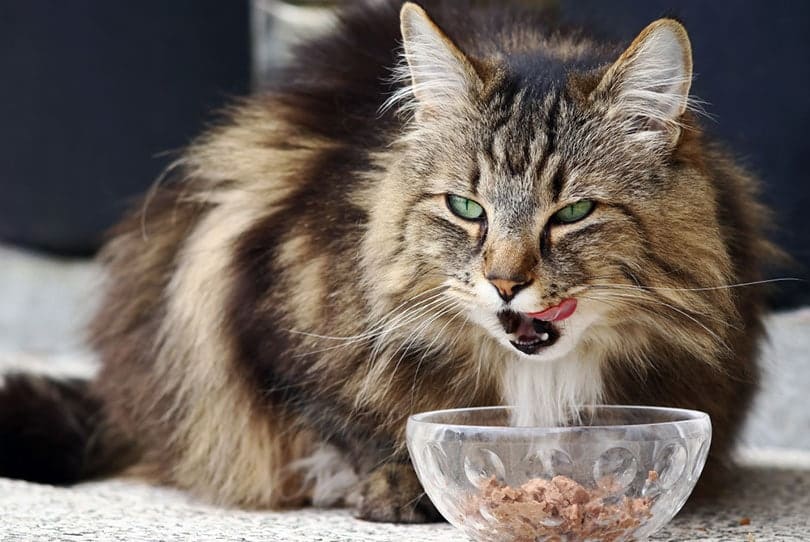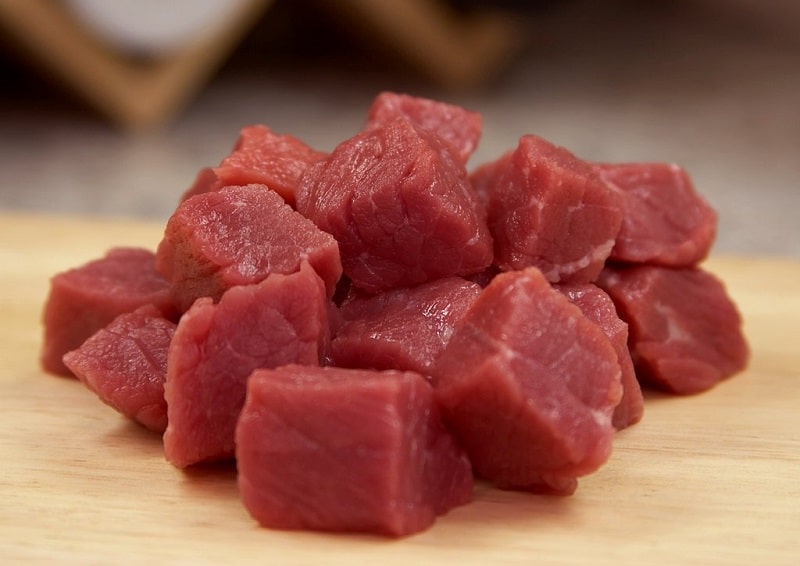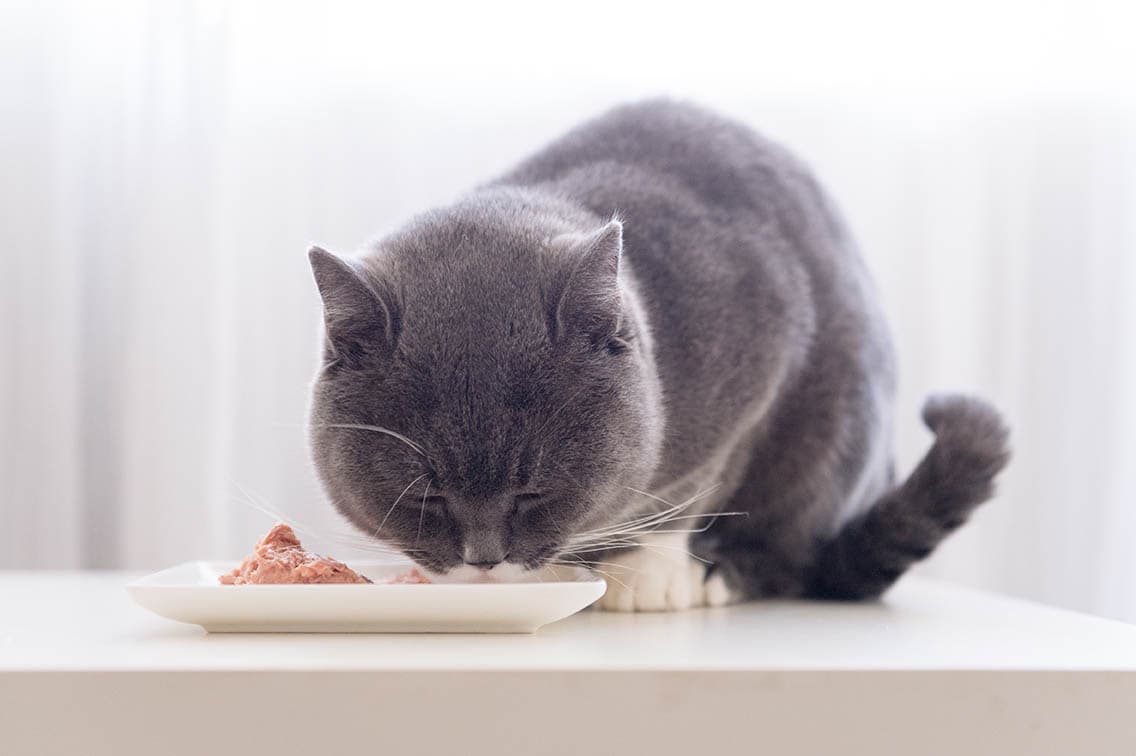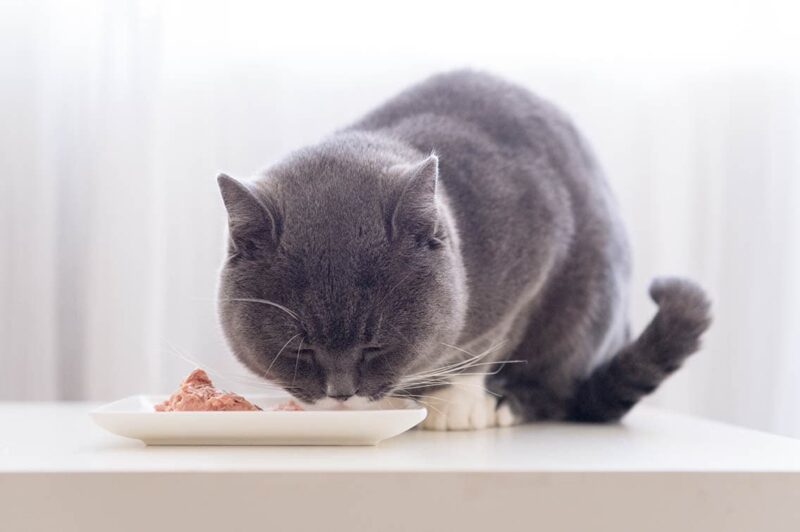Cats are often called “obligate carnivores,” especially in reference to their diet. But what does this mean? In short, obligate carnivores are “true” carnivores. They’re made to thrive off a diet of only meat. They aren’t omnivores like people or dogs (who have evolved to consume grains, fruits, and veggies). To get everything they need from their diet, cats have to eat meat. They’re obligated to.
Cats need more protein than the average dog. Kittens need even more protein than an adult cat does – putting them above many other mammals.

What Nutrients Do Cats Need from Meat?
So, cats are obligate carnivores because they need certain nutrients from meat. One essential amino acid that cats can’t get from any source but meat is taurine. Most animals can make their taurine to some extent, but cats cannot. They must get it from their diet.
If they don’t, cats can develop all sorts of health problems, including dilated cardiomyopathy, retinal degeneration, and reproductive issues. Many factors go into your cat consuming enough taurine – not necessarily just the taurine amount in their cat food. Certain foods can inhibit the absorption and availability of taurine, making a cat deficient even if they’re technically eating enough.
Cats also can’t make another amino acid – arginine. They must consume this amino acid in their diet as well. This nutrient is used to remove ammonia from the body. Without it, ammonia can build up and cause problems, including vomiting, neurological issues, and even death.
Many animals can convert beta-carotene into vitamin A, an essential vitamin. This includes dogs. Many dog foods add beta-carotene to their dog food as vitamin A. However, cats cannot do this. They must consume vitamin A in its active form, which is found in meat.
There are other nutrients as well, but these are the most important. In the end, cats must eat meat to get all the nutrients they need.

Does the Specific Meat Matter?
Cats must eat meat. However, precisely what meat doesn’t matter much. All types of meat include all the amino acids your cat needs, though they may include them in different amounts. Meats will also contain other substances. For instance, fish contain omega fatty acids, which are very good for cats. However, other types of meat do not include this sort of fatty acid. It isn’t unusual to see fish meal added to a food to increase the omega-3 fatty acids content of cat food.
The important part is reading the label and ensuring that your feline’s food is high in meat and protein. After all, as obligate carnivores, meat is essential.
Can a Vegan Own a Cat?
A vegan can own a cat. However, a cat cannot be vegan. There are some specialty dog foods out there that are vegan and can work for dogs. The problem is that cats cannot get many of the nutrients that dogs can get from plants. Vitamin A is an excellent example of this, as we have previously discussed. Humans and dogs can turn beta-carotene – a plant product – into vitamin A. Cats cannot. They must consume active vitamin A from meat.
Taurine is another example. Dogs and humans can make taurine. However, cats cannot and must consume it in their diet. Taurine is only found in meat. Without taurine, a cat’s heart cannot function correctly, and it will eventually die. The heart muscles will be unable to repair, as they need taurine to do so. The muscle will thin and eventually be unable to pump blood.
Furthermore, a cat’s digestive tract just isn’t made to digest high amounts of plants. A vegan diet would be all plants. Therefore, it may cause digestive problems. Your cat may be unable to digest and absorb everything they need, which will cause deficiencies.
You can own a cat as a vegan – but you must be willing to purchase a meat-inclusive food for your feline. While humans may not need meat, cats do.

What Happens if Cats Don’t Eat Meat?
A cat that doesn’t eat meat will not absorb all the vitamins and minerals they need to thrive. Specifically, they will likely become deficient in vitamin A and taurine. Both of these are life-threatening deficiencies that will eventually lead to a cat’s death. Even in “vegan” cat food, vitamin A and taurine are usually added from animal sources. Therefore, while these foods don’t have any meat in them, they do have these meat-derived vitamins in their food.
Is There a Meat Cats Shouldn’t Eat?
Not really. You shouldn’t feed your cat raw meat, as it may be contaminated with bacteria. However, there isn’t a specific type of meat or animal that cats shouldn’t eat (as long as it isn’t toxic – like pufferfish).
While cats do eat raw meat in the wild, this is right after they kill the animal. Therefore, the meat doesn’t have time to develop any food-borne pathogens. This isn’t the case for raw food we feed our cats today, which has often been dead for days or even weeks before it reaches us.

Can Cats Live on Meat Alone?
Technically, yes. However, in the wild, cats would eat the whole prey – including their organs and whatever is in their digestive tract. This is how they would consume some nutrients they wouldn’t get otherwise.
In the modern world, this is not how cats eat. However, the only thing in cat food is muscle meat, which doesn’t include the organs and other animal parts. For this reason, vitamins and minerals must be added. Sometimes, this takes small amounts of veggies and fruits, which is perfectly fine as long as it is in moderation.
You cannot simply feed your cat boiled chicken, for instance. They thrive on a diet full of a variety of meats and the whole prey. When that can’t be given to them, added nutrients are a must.
Featured Image Credit: Chendongshan, Shutterstock






